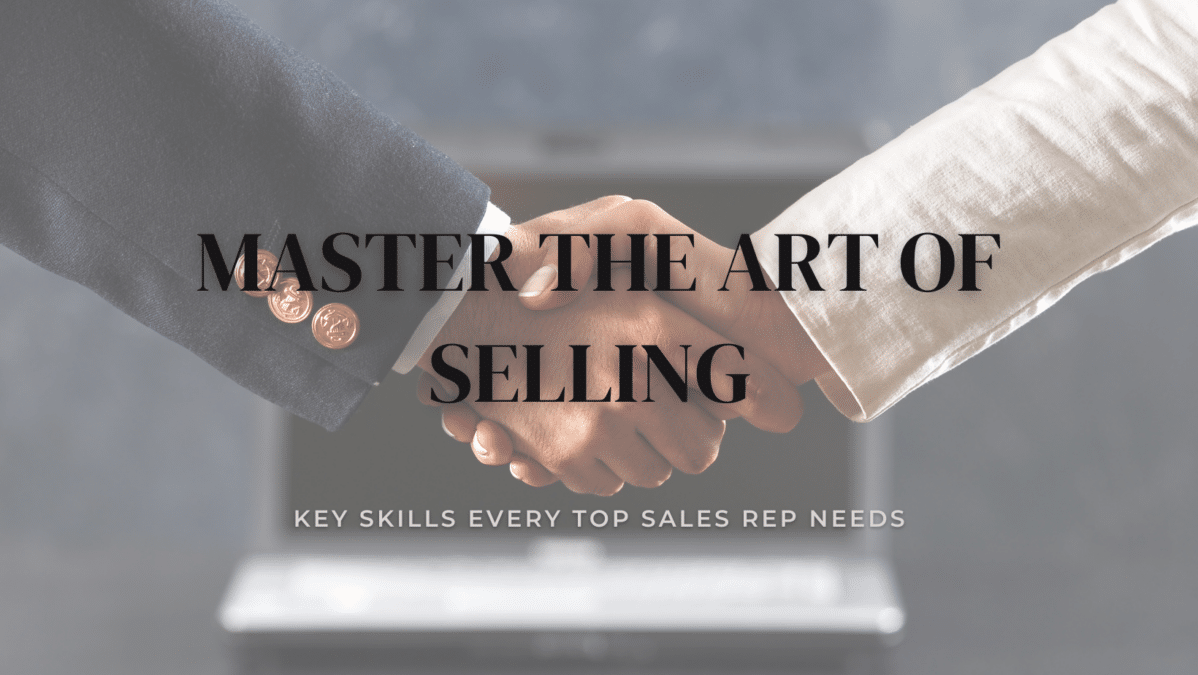
Social Commerce Stats You Need to Know
February 1, 2022
What Will Influencer Marketing Look Like in the Future?
February 21, 2022Here Are 7 Essential Selling Skills For Successful Sales Reps
The sales industry has changed, and now companies focus on building connections by understanding their customer’s needs; for salespeople to succeed, they need to continuously improve their skills.
Sometimes, people think of a salesperson as the slick guy trying to sell you a lemon of a used car. But the sales industry has changed dramatically in the last decade. Companies are more upfront and actually listen to customers’ needs; they’re not just in it to make a buck, they’re in it to make connections. From product and market expertise to messaging and value propositions, salespeople need to know a lot. The development of the right selling skills results in more meaningful conversations with every buyer. But which skills are most important for your sellers to master?
Well, it varies based on the role, industry, and the buyers you’re targeting, but there are a few things that work across the board. If you want to be an effective salesperson, you need to consistently learn, grow, and bolster your sales skillset.
What are Selling Skills?
Selling skills are the fundamental techniques and processes salespeople master and incorporate into their efforts. They’re typically taught through coaching, refined through experience, and leveraged to cater to a wide variety of prospects on a more thoughtful, personal level.
You can’t conduct successful sales efforts without having at least basic selling skills. You need to know how to source information on prospects, communicate with them effectively, and craft enticing value propositions if you want to make it in the field.
The best sales efforts involve a lot of thoughtfulness, engaging rhetoric, and a personal touch. You want your prospects to know you’ve thoroughly considered their needs, understand where they’re coming from, and sincerely believe that the solution you’re selling is the one that will work best for them.
Here’s a look at seven of the most important skill sets every salesperson should know.
Essential Selling Skills Every Rep Should Have

1) Have Empathy
Every sale should be inherently buyer-centric — a process where you, as a salesperson, take on a helpful, consultative role to help improve your prospect’s life or business with your product or service.
This may sound cheesy, but the best salespeople don’t sell purely for the sake of selling — they sell because they believe their product or service is the best solution to their prospects’ problem.
Taking the time to consider your prospect’s circumstances, focusing on relationship building, and staying mindful of how your prospects are feeling, informs you on how to pace your sales efforts.
The goal is to always maintain a human element with every sale. You should want to solve for the prospect more than you want to sell to them.
2) Stay True to the Sales Process
Sales is both an art and a science. Effective sales efforts are the result of striking a balance between the two. You should be able to demonstrate some “artistic” finesse and think on your feet, while your approach should be underscored by some “scientific” discipline.
Your organization has a sales process in place for a reason. Very few — if any — successful companies set their salespeople loose and say, “Figure it out as you go.” Having a structure on how to consistently conduct efforts that deliver the results you’re looking for will set you up for success.
That’s not to say you can’t add your personal flair within its boundaries. Sales will always require some degree of direction, and that “direction” is generally a byproduct of how well you can adhere to your sales process.
3) Integrity
Being able to set and meet reasonable expectations with buyers is central to building trust and establishing productive relationships — that starts with you being upfront about the nature of the purchasing process as a sale progresses.
Honesty and integrity won’t be lost on prospects. Like a number of other points on this list, this one rests on the value of sincerity and the merit of taking a consultative approach to selling. Again, every sale should revolve around helping the prospect — above all else.
If you mislead them about what the purchasing process looks like, what features they’ll have access to, or how much they’re ultimately going to pay for your offering, you’ll undermine your credibility and potentially lose out on a deal during the home stretch.
Make sure you can back up every promise you make, and be as clear as possible about what they’re getting at the price point they purchase at. If you don’t, you run the risk of bringing on a disgruntled customer that will churn quickly, vocalize their frustrations, and hurt your reputation down the line.
4) Conduct Effective Buyer Research
You can’t appeal to a buyer if you have no idea who they are, what they do, and what their needs might be.
Conduct extensive buyer research. The best salespeople know what to look for, where to look for it, and how to effectively analyze those findings. Find them online or talk to people they may know. What’s their background like? Can you identify any interests they might have to help you build rapport?
Try to address as many angles as possible here. Put together a holistic picture of your prospect and their business, and start to tailor your communication to best connect with them — whether that be through something like a personalized gift, some industry-specific insight, or any other way you can think of to let them know you’re locked in on their interests.
5) Develop Extensive Product Knowledge
You can’t sell a product or service effectively if you don’t know it inside and out. Understanding everything there is to understand about your offering informs other key elements of your sales efforts.
You can’t anticipate or handle objections if you don’t know the issues prospects consistently raise about your product or service’s functionality. You can’t structure an effective value proposition if you don’t know what kind of value your product or service can offer. You can’t differentiate yourself from your competitors if you don’t know the features your offering has that theirs don’t.
Take the time to thoroughly study your product or service. Know what makes it an exceptional option and where it might lag behind competitors. Know who stands to gain the most from it. Know what it costs and why it costs that much. Know its every last feature, bell, and whistle.
This will allow you to be in a better position to craft thoughtful, personalized value propositions that prospects will be receptive to. That, in itself, is the key to conducting effective sales efforts.
6) Be a Compelling Storyteller
Communication with prospects needs to be engaging if it’s going to be effective. You want your buyer to have a personal stake in the sale — and using compelling storytelling to shape your pitches, presentations, and other correspondence with them helps that case.
Know some relevant case studies front to back — and leverage those stories to help your prospect imagine how they would use your product or service. Be sure to cover elements like character, context, conflict, and an ultimate resolution.
7) Demonstrate Potential Return on Investment
Paint a clear, persuasive, and believable picture of the results a purchase will yield when engaging with prospects.
Case studies, data from your client base, and your own estimates — based on the information your prospect gives you — can help you paint a more vivid picture than simply saying something like, “This is worth it because it will save you time.”
It’s also helpful to connect current customers with your prospects for an unvarnished opinion of your product or service. Positive reviews from an engaged customer base have been proven to have significant sway on new prospects’ decision-making — in fact, a recent study by BrightLocal showed positive reviews make 73% of consumers trust local businesses more.
Selling Skills Used to Engage Customers
The list of skills detailed in this article is far from exhaustive. Learning skills is a process. As a salesperson, you need to consistently identify and work on areas for improvement as they become obvious — learn from every sale and incorporate the lessons that come with your experience into your broader sales repertoire.
The underlying theme of every skill you can develop is this: Engage your prospects. Conducting extensive buyer research enables you to engage your prospects with more pointed outreach and pitches.
Being a compelling storyteller makes your communication more engaging by nature. Leading with empathy allows you to engage potential customers through more personal appeals.
Do what you can to develop and hone your selling skills. Always be mindful of what you could be doing better and act on that insight whenever you can.




